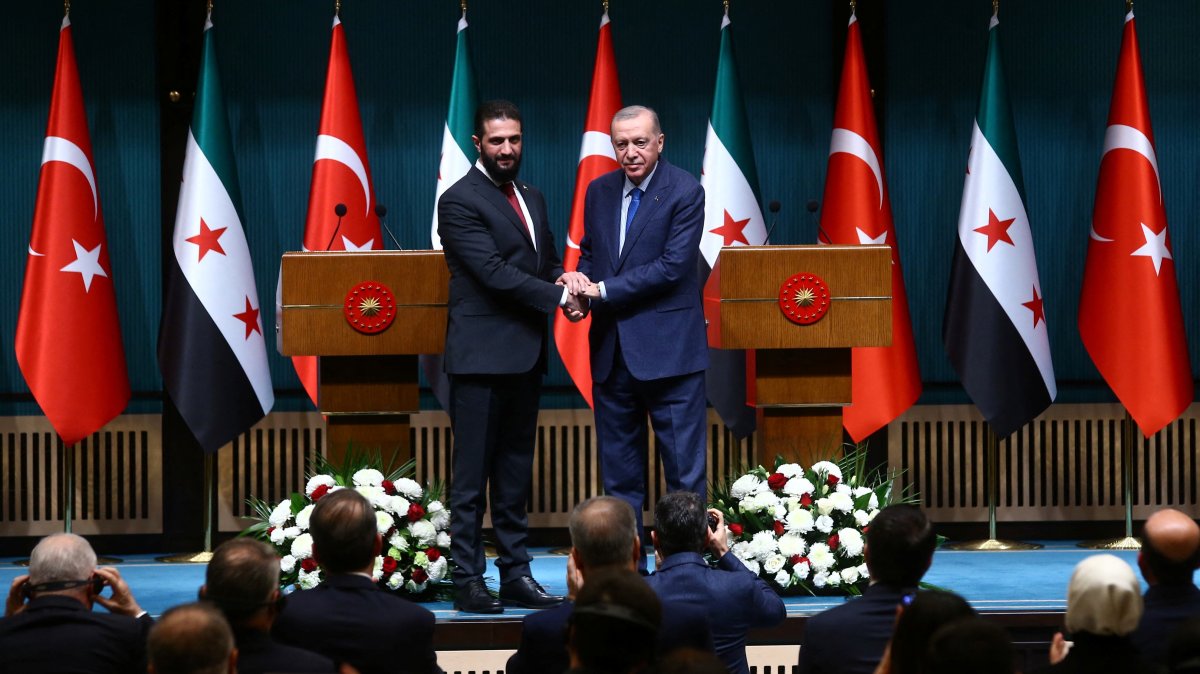Transport and manufacturing firms from Türkiye eye big expansion plans for Syria in what some expect will be a tripling of trade, as President Recep Tayyip Erdoğan and Syrian interim President Ahmed al-Sharaa addressed economic ties on Tuesday in talks focused on the war-torn nation’s recovery.
Turkish exports to the neighboring country rose 20% in December, when al-Sharaa’s forces ousted longtime dictator Bashar Assad, and jumped by more than 38% in January, Turkish Exporters Assembly (TIM) data show.
Heads of Turkish companies and associations told Reuters they were making new freight connections and capacity investment plans in war-scarred Syria, and they expect economic ties to grow significantly.
During a visit to Ankara on Tuesday, al-Sharaa and Erdoğan discussed “possible joint measures to rebuild the country’s economy,” according to a statement from the Directorate of Communications.
Türkiye – which has emerged with the closest ties with Damascus after having backed opposition forces during Syria’s 13-year civil war – was al-Sharaa’s second foreign visit since he became transitional leader, following his trip to Saudi Arabia.
Speaking alongside al-Sharaa at a news conference, Erdoğan said the two leaders evaluated “the joint steps that could be taken to establish security and economic stability in the country” and that they were “pleased to see that we agreed on almost every issue.”
Al-Sharaa, for his part, said economic cooperation was a key part of their discussions. “We will enhance trade and investment between the two countries … in order to achieve economic recovery and establish a better future,” he said.
Underscoring Syria’s immediate need to rebuild, Turkish machinery exports there soared 244% last month, while cement, glass and ceramics jumped 92% and metals rose 73%. Fruit and vegetable exports also more than tripled.
Exports “could be more than $6 billion (TL 215.61 billion) if trade were not hurt by developments in Syria in the last 13 years,” said Bilgehan Engin, president of the Turkish Forwarding and Logistics Association, adding it could reach this level in two to five years.
Last year, Türkiye’s exports to Syria stood at $2.2 billion, while its imports were $437 million, official data showed.
Trade currently runs through a buffer zone at the Bab al-Hawa border crossing, where Turkish trucks transfer cargo to Syrian trucks due partly to security concerns. Exporters and business leaders said this raises costs and shipping time.
Engin said a bilateral agreement to eliminate the buffer zone and free up Turkish transport movement inside Syria would allow trade to expand.
Türkiye’s Trade Ministry said last month that Syrian and Turkish authorities agreed to start talks to revive a free trade agreement and deepen cooperation in transport, contracting and investment across Syria.
Ibrahim Fuat Özçörekçi, head of the Türkiye-Syria Business Council under the Foreign Economic Relations Board (DEIK), has said that Türkiye aims to reach $10 billion in bilateral trade in the medium term.
National flag carrier Turkish Airlines is one of a handful of carriers to have resumed flights to Damascus after a 13-year suspension.
Economic overhaul
In a major shift from decades of corrupt state control, Syria’s new leaders are undertaking a radical overhaul toward a free-market economy welcoming investment, the new economy minister, Basil Abdel Hanan, told Reuters last week.
In response, Türkiye has moved to assist in providing electricity, setting up a maritime demarcation deal and re-establishing banking ties.
“Syria will offer great opportunities in logistics and we are making preparations (including) new investment plans in the Iskenderun and Mersin” dry ports, said Mehmet Altınsoy, general manager of Pasifik Euroasia, which operates terminal services, railway, air and sea transportation.
The company will ramp up terminal investments to meet new Syria-related business, he said.
Serdar Ayırtman, chief executive of Catoni Group, a freight forwarding and shipping services company, said shipowners have been reaching out to his firm to offer supplies for the expected rebuilding of Syria.
“There is talk of a $400 billion cake for the reconstruction of Syria (including) infrastructure investments, power plants, other major construction and project transportation,” he said.
“Turkish companies may or may not undertake these projects, but logistically Türkiye’s port and road infrastructure will be the key hub for transportation of goods.”
Syria’s nearest ports are in Türkiye and Lebanon.
Along the 910-kilometer (565-mile) land border, some Turkish manufacturers are calling for a designated zone within Syria where they can produce at lower costs.
“It is becoming more difficult to find the labor force in Türkiye and costs are increasing,” said Ahmet Öksüz, chair of Istanbul Textile and Raw Materials Exporters’ Association.
He said such a zone could also contribute to the return of some of the more than 3 million Syrian migrants in Türkiye.
Inviting Erdoğan to visit Syria “at the earliest opportunity,” al-Sharaa hailed Türkiye for its willingness to take in millions of Syrians who fled during the civil war, saying his nation would “never forget (Türkiye’s) historic stance.”
“That significant support is still tangible through Türkiye’s ongoing efforts to ensure the success of the current leadership in Syria politically and economically,” he said.
Erdoğan said he believed the voluntary return of Syrian migrants would accelerate as Syria became more stable.
He said Türkiye would continue to press for the lifting of international sanctions imposed on Syria during the Assad regime, adding that it was important for Arab and Muslim countries to support the new Damascus government – financially and otherwise – in the period of transition.
Hakan Bucak, a former board director at the Turkish-Syrian Business Council, said he was considering reopening a quarry in Akçakale, 40 kilometers from the border, that had mainly served Syrian buyers but that he had shut down due to war there.
“Now we can reopen it as the demand reappears,” said Bucak. “This means employing at least 150-200 people in the region. Many other investments will come back – not just ours.”
